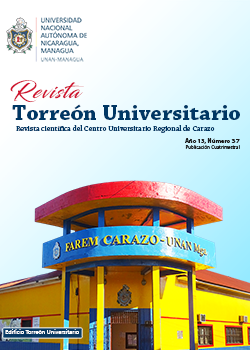The development of oral competence in teaching learning as a foreign language with information and communication technologies.
DOI:
https://doi.org/10.5377/rtu.v13i37.18182Keywords:
Communicative competences, Strategies, Teaching, English learning, ICTAbstract
The acquisition of oral competence in learning English lies in the difficulty of a series of complex skills that go beyond the mere memorization of vocabulary and grammar. Students must be able to understand and process the language in real-time, improvise responses, maintain fluency, pronounce, develop security and confidence when expressing themselves orally. These challenges are exacerbated by factors such as limited exposure to English outside the classroom, anxiety, and lack of opportunities to practice oral communication in a meaningful and contextualized way. This research aims to analyze the impact of the use of information and communication technologies (ICT) on the development of oral competence within the teaching-learning process of the English language. The study was conducted with third-year English major students of different learning levels and employed a mixed approach, combining quantitative and qualitative methods, as well as conducting surveys, interviews, focus groups, and classroom observations related to the use of ICT. The results show that the use of new educational multimedia applications has been effective in improving English phonetics and pronunciation, and the teachers reported greater student motivation and participation in oral activities. Based on the findings, it is concluded that the integration of ICT has a positive impact on the development of students' oral competence, due to the interactive, dynamic, and motivating nature of technological tools, which allow them to practice and improve their communication skills more effectively.
Downloads
1311
HTML (Español (España)) 431
PDF 70
HTML 33
References
Anderson. (2011). La importancia de aprender una segunda lengua. México: Mexico. Revista México. Revista México, Ciudad Mèxico.
Backhouse. (2014). Los principales problemas fonéticos y fonológicos en la enseñanza. Hogskolan Dalarna.
Garcia. (2010). Uso pedagógico de materiales y recursos educativos de las tics:. Revista Mèxico.
Herman. (2016). Dificulties in pronuncing the english labiodental sounds. . Revista Mèxico,, Mèxico.
Hernández. (2017). Medios tecnológicos entre estudiantes y docentes. Revista de Educación, Editorial Universidad, Ciudad, Mèxico.
Melendez. (2016). Estimulación de la motivación y su influencia en el aprendizaje. Revista UNAN Managua, 45-60.
Rodriguez. (2022). El método de la investigación cientifica. . Universidad Libre y en la Universidad Santiago de Cali.
Serres. (2013). ‘’Generación Pulgarcita’’. Fondo de Cultura Económica:Tezontle, Ecuador.
Downloads
Published
How to Cite
Issue
Section
License
Copyright (c) 2024 National Autonomous University of Nicaragua, Managua

This work is licensed under a Creative Commons Attribution-NonCommercial-NoDerivatives 4.0 International License.
Los autores que publican en esta revista están de acuerdo con los siguientes términos.
- El autor o los autores de los artículos, ensayos o investigaciones conceden a la Universidad Nacional Autónoma de Nicaragua, Managua (UNAN-Managua) los derechos de edición (copyright) del trabajo enviado, por consiguiente la Universidad cuenta con el derecho exclusivo para publicar el artículo durante el periodo completo de los derechos de autor.
- Estos derechos de autor/ autores autorizan a la Revista Torreón Universitario y a la Universidad editar y divulgar/publicar el artículo en dicha Revista, incluyendo reproducción impresa y electrónica, el almacenamiento, recuperación y cualquier otro tipo de publicación, y fuentes de información secundaria como servicios de resúmenes y bases de datos, así mismo la facultan a proteger el artículo contra el uso no autorizado para su difusión por medios impresos o electrónicos (PDF, HTML, EPUB, XML u otros).
Licencia para el uso del contenido
La revista hace uso de la Licencia Creative Commons Atribución-NoComercial-SinDerivar 4.0 Internacional.
Bajo esta declaración:

Este revista está sujeta a una licencia de Creative Commons Reconocimiento-NoComercial-SinObraDerivada 4.0 Internacional. Puede ser copiada, distribuida y transmitida públicamente siempre y cuando se cite al autor y la fuente (Revista Torreón Universitario), no debe modificarse ni utilizarse con ningún fin comercial. La licencia completa se puede consultar en http://creativecommons.org/licenses/by-nc-nd/4.0/.



